#CNC manufacturing
Text
How to Choose the Right Manufacturing Processes for Electronic Enclosures?

In the realm of electronic enclosures, selecting the appropriate manufacturing processes is crucial to ensure the functionality, durability, and overall quality of the final product. With advancements in technology and manufacturing capabilities, there's a myriad of options available, making the decision-making process daunting. However, by understanding your requirements and considering factors such as CNC milling and on-demand manufacturing, you can streamline the selection process effectively.
CNC milling stands as one of the leading manufacturing processes for electronic enclosures, offering precision, versatility, and efficiency. RPWORLD, a pioneering name in manufacturing solutions, leverages CNC milling to produce high-quality enclosures tailored to specific needs. With CNC milling, intricate designs and precise specifications can be achieved with utmost accuracy, making it ideal for complex electronic enclosure designs.
One of the key advantages of CNC Milling is its ability to work with various materials, including metals and plastics, providing flexibility in material selection based on the application's requirements. Whether you need enclosures with robust metallic properties or lightweight yet durable plastic ones, CNC milling can cater to diverse material preferences.
Moreover, CNC milling facilitates rapid prototyping, allowing for quick iterations and modifications during the design phase. This iterative approach ensures that the final enclosure meets all functional and aesthetic criteria, minimizing design flaws and optimizing performance.
In addition to CNC milling, on-demand manufacturing emerges as a game-changer in the electronic enclosure industry. RPWORLD's on-demand manufacturing services offer unparalleled flexibility and scalability, catering to businesses of all sizes. Unlike traditional manufacturing methods that entail large batch productions, on-demand manufacturing allows for the production of enclosures in quantities as per the specific requirements, reducing excess inventory and minimizing costs.
The On-Demand Manufacturing model also accelerates the production timeline, enabling faster turnaround times from design to delivery. This agility is invaluable, especially in dynamic industries where speed-to-market is paramount. With RPWORLD's on-demand manufacturing, you can swiftly adapt to changing market demands and capitalize on emerging opportunities without being constrained by lengthy production cycles.
When selecting the right manufacturing processes for electronic enclosures, it's essential to consider factors such as design complexity, material compatibility, production volume, and lead times. By leveraging CNC milling and on-demand manufacturing offered by RPWORLD, you can address these considerations effectively while ensuring superior quality and cost-efficiency.
Furthermore, RPWORLD's expertise in CNC milling and on-demand manufacturing is backed by state-of-the-art facilities, cutting-edge technologies, and a team of experienced professionals dedicated to delivering excellence at every stage of the production process. Whether you're a startup venturing into the electronics industry or an established enterprise seeking innovative manufacturing solutions, RPWORLD offers tailored services to meet your specific needs and exceed your expectations.
In conclusion, choosing the right manufacturing processes for electronic enclosures is paramount for achieving optimal performance, durability, and cost-effectiveness. With CNC milling and on-demand manufacturing from RPWORLD, you can unlock endless possibilities in design, production, and scalability, empowering your business to thrive in a competitive landscape while staying ahead of the curve.
0 notes
Text
Revolutionizing Manufacturing: A Beginner's Guide to CNC Manufacturing
CNC manufacturing, or computer numerical control manufacturing, is a process used to create parts and products by using computer-controlled machines. This technology has revolutionized manufacturing by providing greater accuracy, efficiency, and speed. Here's an overview of CNC manufacturing and how it works.
CNC Manufacturing Process
The CNC manufacturing process involves the use of computer-controlled machines, such as lathes, mills, routers, and plasma cutters, to create precise parts and products. The process typically involves the following steps:

Design: The first step in the CNC Manufacturing process is designing the part or product using computer-aided design (CAD) software. This software allows designers to create a digital model of the part or product, including its dimensions and specifications.
Programming: Once the design is complete, the CAD file is converted into a CNC program that the machine can understand. This involves using computer-aided manufacturing (CAM) software to generate a toolpath that the machine will follow to create the part or product.
Setup: The machine is then set up to produce the part or product. This involves loading the CNC program, positioning the workpiece, and setting the machine parameters.
Machining: The machine then performs the machining operations according to the programmed toolpath. This typically involves cutting, drilling, or shaping the workpiece using a variety of tools.
Inspection: Once the machining is complete, the part or product is inspected to ensure that it meets the required specifications.
Benefits of CNC Manufacturing
Cnc Machining USA offers several benefits over traditional manufacturing methods, including:
Greater accuracy: CNC machines can produce parts and products with a high degree of accuracy and precision, which is critical in many industries.
Increased efficiency: CNC machines can work continuously and at high speeds, which can increase productivity and reduce lead times.
Cost-effectiveness: CNC manufacturing can be cost-effective, especially for large-scale production runs, as it reduces labor costs and minimizes material waste.
Flexibility: CNC machines can be programmed to produce a wide range of parts and products, making them a versatile manufacturing solution.
Applications of CNC Manufacturing
CNC manufacturing is used in a variety of industries, including:
Aerospace: CNC manufacturing is used to create precision parts for aircraft, satellites, and other aerospace applications.
Automotive: CNC manufacturing is used to produce engine parts, transmissions, and other automotive components.
Medical: CNC manufacturing is used to create medical implants, prosthetics, and other medical devices.
Consumer products: CNC manufacturing is used to produce a wide range of consumer products, including electronics, furniture, and toys.
By using CNC manufacturing, companies can produce high-quality, precise parts and products at a faster rate and lower cost, making it an essential process in today's manufacturing industry.
Click Here For More Information:-
Custom Molded Plastic
Family Molding
1 note
·
View note
Text
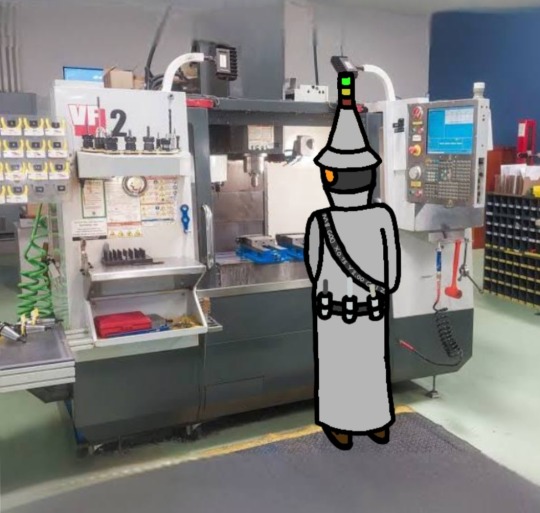
The Manufacturing Wizard inspects a CNC milling machine. His belt is similar to a chain-type automatic tool changer, and he uses it to hold a couple cutting tools.
#kuka haas#manufacturing wizard#my art#manufacturing#cnc machine#I put some G-code on the other belt
9 notes
·
View notes
Note
I wanna see the necklace omg! That’s so cool of y’all
THANK YOU FOR ENABLING ME you are my favorite
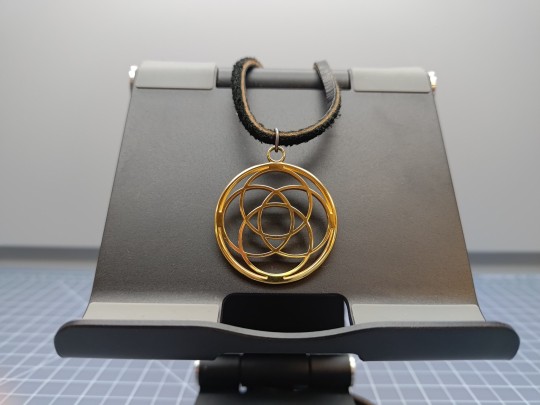
we used to have a silver otherkin star that we wore daily, but the top fixture snapped. rather than replace it, we figured the plural rings were a little more accurate for us now, anyway.
a friend ended up doing the model (albeit while we sat behind and gave feedback), we paid shapeways for the printing, for speed & just to save us the trouble of actually producing something to "daily wear" standards. would recommend.
#tekkapost#i think shirou deserves 90% of the credit for this one#it's possible saïx had a hand in it also but i can't recall.#gold was almost certainly a shirou choice though. (sip emote.)#it's stood the test of time like a fuckin champ.#skin oils. various manufacturing grimes. god knows what it's on our body 24/7.#it is quite large also!#it hasn't been RECOGNIZED yet#we have had folks ask what it is and uh#don't have a good answer for that still!#we're not out at work as a system but we work mainly with nerds so!#as a sidenote since i'm talking work & processes:#i do have access to various forms of 3D printing at work including MJF#that would not have been suitable for this kind of part though#talking slightly out my ass here but this was almost certainly SLS#while we do have 2 CNC mills onsite they're not open to staff requests like our printers are#for good reason#though our machinist is the one who got me that job.#jesus christ i owe him one.#several. many.#anyway.#we genuinely couldn't find any plural symbol charms that werent either#absolutely tiny or like...a printed image in a container#so we took matters into our own hands.#this picture was taken shortly after it was made it has sustained some wear since.
6 notes
·
View notes
Text
Maintenance Tips for Your CNC Turning Machine by MechPlus China
As a leading CNC turning machine manufacturing, MechPlus China understands the importance of proper maintenance to ensure precision and efficiency. Regular upkeep not only extends the machine's lifespan but also maximizes productivity and quality. Here are essential maintenance tips from MechPlus China to keep your CNC turning machine running smoothly and efficiently.
Keeping your CNC turning machine in top condition is crucial for optimal performance. Regular maintenance not only extends the machine's lifespan but also ensures precision and efficiency in your operations. Here are essential maintenance tips to keep your CNC turning machine running smoothly.
Daily Inspection and Cleaning
Start each day with a thorough inspection of your CNC turning machine. Check for any signs of wear and tear, and ensure all components are in good working order. Clean the machine daily to remove any debris, chips, and coolant residue. This prevents buildup that can affect performance and accuracy.
Lubrication
Proper lubrication is vital for the smooth operation of your CNC turning machine. Lubricate all moving parts as recommended by the manufacturer. This includes the spindle, guideways, and ball screws. Regular lubrication reduces friction, prevents wear, and extends the machine’s life.
Coolant Maintenance
Maintaining the coolant system is essential for the longevity of your CNC machine. Regularly check the coolant level and concentration. Replace or refill the coolant as needed. Also, clean the coolant tank and filters to avoid contamination that can damage the machine and workpieces.
Alignment and Calibration
Ensure that your CNC turning machine is properly aligned and calibrated. Misalignment can lead to inaccuracies in your machining processes. Regularly check and adjust the machine’s alignment and calibration according to the manufacturer’s guidelines. This ensures precision in your operations.
Check Electrical Components
Inspect the electrical components of your CNC turning machine regularly. Look for any loose connections, worn-out wires, or faulty switches. Address any electrical issues immediately to prevent machine downtime and potential safety hazards.
Monitor Machine Vibration
Excessive vibration can lead to poor machining quality and damage to your CNC turning machine. Monitor the machine for any unusual vibrations or noises during operation. Identify and address the source of the vibration to maintain optimal performance.
Regular Software Updates
Keep your CNC machine’s software up to date. Manufacturers often release updates that improve functionality and fix bugs. Regularly updating the software ensures your machine operates efficiently and takes advantage of the latest technological advancements.
Tool Maintenance
Regularly inspect and maintain the cutting tools used in your CNC turning machine. Sharp and well-maintained tools are crucial for high-quality machining. Replace worn or damaged tools promptly to ensure precise and efficient operation.
Preventive Maintenance Schedule
Implement a preventive maintenance schedule for your quick response machining tool. Follow the manufacturer’s recommended maintenance intervals for all components. Regular preventive maintenance helps identify potential issues before they become major problems, reducing downtime and repair costs.
Training and Safety
Ensure that all operators are properly trained in the maintenance and operation of the CNC turning machine. Regular training updates and adherence to safety protocols are crucial for preventing accidents and ensuring smooth operations.
Document Maintenance Activities
Keep detailed records of all maintenance activities performed on your CNC turning machine. Documenting maintenance helps track the machine’s condition over time and provides valuable information for troubleshooting and repairs with all types of customized machining parts.
In conclusion, regular maintenance of your CNC turning machine is essential for its longevity and performance. By following these tips, you can ensure your machine operates efficiently, reducing downtime and improving the quality of your machining processes. Implement these maintenance practices to keep your CNC turning machine in optimal condition.
#Prototyping solutions#SLA Rapid Prototyping manufacturing#SLS Rapid machining manufacturing#5 Axis CNC machining manufacturing#3D metal printing manufacturing
2 notes
·
View notes
Text
#Stainless Steel Pin Manufacturer in Delhi#Stainless Steel Pins Manufacturer#Hinge Pins Manufacturer#Dowel Pins Manufacturer#KNURLED PINS Manufacturer#Precision CNC Turned Component Manufacturer#Precision Turned Component Manufacturer
2 notes
·
View notes
Text
The Importance of High-tech Rapid Prototyping
In the industrial industry, precision is not only desirable—it is essential. Consider a situation in which parts of a jet engine are even marginally machined incorrectly or misaligned. The repercussions can be disastrous and might cause the engine to fail in midair. Precision becomes the key to success in sectors like aerospace, automotive, and medical where safety and dependability are non-negotiable. Put simply, it's the capacity to manufacture parts or components that precisely conform to given dimensions, tolerances, and quality requirements. It takes state-of-the-art equipment, painstaking attention to detail, and highly competent operators to achieve this degree of accuracy. This is the sweet spot for Precision CNC Machining.
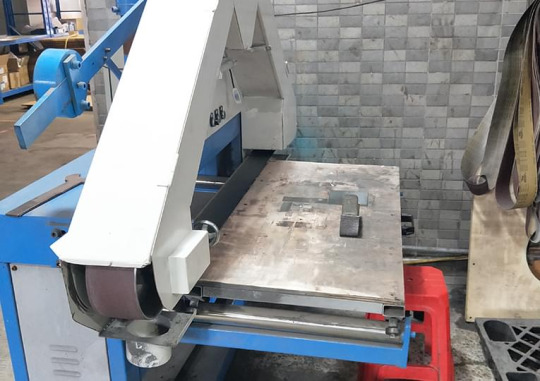
So how precisely can CNC machining accomplish such high precision levels?
Computerized Control: Advanced computer software is the brains of CNC machining, translating digital design requirements into exact motions and orders for the milling tools. This removes the possibility of human error and guarantees the highest level of precision in each cut, drill, and mill.
Superior Quality Equipment: Modern spindles, tools, and cutting implements that are designed to provide exact results are standard on CNC machines. These devices may operate at extremely tight tolerances, which are sometimes expressed in microns, guaranteeing an accurate reproduction of even the minutest features.
Consistency: The ability of CNC machining and High-tech Rapid Prototyping to manufacture similar components with little variance is one of its main advantages. A machine program that has been developed and tuned may be repeated endlessly with reliable outcomes. In fields where stability and dependability are critical, this degree of constancy is priceless.
Advanced Techniques: Multi-axis milling, turning, EDM (Electrical Discharge Machining), laser cutting, and other state-of-the-art methods are all included in CNC machining. With unmatched accuracy and efficiency, manufacturers can handle complicated geometries and materials thanks to these procedures.
Quality Assurance: CNC systems frequently include integrated quality control mechanisms including automated inspections, feedback loops, and real-time monitoring in addition to accurate machining. This reduces waste and rework by guaranteeing that any deviations from the intended standards are quickly identified and fixed. It is impossible to exaggerate the value of accuracy in production. Precision by Precision CNC Machining Manufacturer plays a crucial role in today's competitive economy, as it ensures everything from satisfying regulatory requirements and consumer expectations to assuring product performance and dependability.
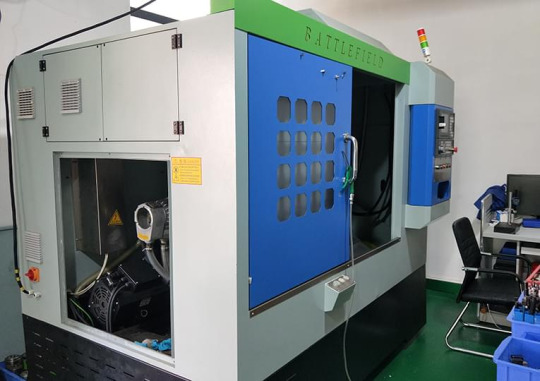
Follow our Facebook and Twitter for more information about our product
#High-tech Rapid Prototyping#Precision CNC Machining#Precision CNC Machining Manufacturer#CNC Machining Manufacturer Company
2 notes
·
View notes
Text
https://berlin-machineries.com/
Buy Cnc fiber laser cutting machine, cnc edm wire cut machine, vertical turret milling machine, znc electric spark discharge machine, radial and pillar drill machine at best cost.
#CNC Fiber Laser Cutting Machine#CNC Fiber Laser Cutting Machine supplier#CNC Fiber Laser Cutting Machine Manufacturer#CNC Fiber Laser Cutting Machine supplier in pune#CNC Fiber Laser Cutting Machine Manufacturer in pune#Hydraulic Brake Press Machine#Hydraulic Brake Press Machine supplier#Hydraulic Brake Press Machine Manufacturer#Hydraulic Brake Press Machine supplier in pune#Hydraulic Brake Press Machine Manufacturer in pune#CNC EDM Wire Cut Machine#CNC EDM Wire Cut Machine supplier#CNC EDM Wire Cut Machine Manufacturer#CNC EDM Wire Cut Machine supplier in pune#CNC EDM Wire Cut Machine Manufacturer in pune#EDM Drilling Machine#EDM Drilling Machine supplier#EDM Drilling Machine Manufacturer#EDM Drilling Machine supplier in pune#EDM Drilling Machine Manufacturer in pune#ZNC Electric Spark Discharge Machine#ZNC Electric Spark Discharge Machine supplier#ZNC Electric Spark Discharge Machine Manufacturer#ZNC Electric Spark Discharge Machine supplier in pune#ZNC Electric Spark Discharge Machine Manufacturer in pune#Vertical Turret Milling Machine#Vertical Turret Milling Machine supplier#Vertical Turret Milling Machine Manufacturer#Vertical Turret Milling Machine supplier in pune#Vertical Turret Milling Machine Manufacturer in pune
3 notes
·
View notes
Text
CNC metal machining
#design#autos#business#prototyping#cnc machining#prototype#prototype machining#rapid prototyping#precision machining#machining parts#cnc precision machining#cnc metal fabrication#cnc metal process#metal cnc#metal machining#cnc processing#cnc manufacturer#cnc manufacturing
1 note
·
View note
Text
Transforming Biotech Research Device Development with Customized CNC Machining

In the ever-evolving landscape of biotechnology research, innovation is key to staying ahead. As the demand for precision instruments and devices continues to soar, the need for efficient manufacturing processes becomes paramount. This is where machining manufacturers and rapid tooling solutions come into play, revolutionizing the biotech industry by offering customized CNC machining services.
Machining manufacturers play a pivotal role in transforming the conceptual designs of biotech research devices into tangible realities. By leveraging advanced technologies such as Computer Numerical Control (CNC) machining, these manufacturers can precisely fabricate intricate components with unmatched accuracy and consistency. This level of precision is essential in the development of biotech instruments where even the slightest deviation can affect performance.
At RPWORLD, we specialize in providing tailored CNC machining solutions to meet the unique requirements of biotech research device development. Our state-of-the-art facilities and team of skilled engineers enable us to deliver high-quality components with quick turnaround times. Whether it's prototyping a new device or mass-producing components for commercial use, our expertise in Rapid Tooling ensures that projects are completed efficiently without compromising on quality.
One of the primary advantages of CNC machining in biotech research device development is its ability to accommodate complex geometries and materials. Biotech instruments often feature intricate designs and require specific materials to meet performance criteria. With CNC machining, manufacturers can work with a wide range of materials, including metals, plastics, and composites, to produce components that meet the exact specifications of the application.
Furthermore, CNC machining offers unmatched repeatability, ensuring that each component produced adheres to the same precise dimensions. This level of consistency is crucial in the biotech industry, where reproducibility is essential for conducting reliable experiments and studies. By partnering with a Machining Manufacturer like RPWORLD, biotech companies can streamline their production processes and reduce the risk of errors or inconsistencies in their research devices.
In addition to precision and repeatability, CNC machining also offers flexibility in design iterations. Biotech research is a dynamic field where innovation and adaptation are constant. With CNC machining, manufacturers can quickly iterate on designs and make adjustments as needed, allowing for rapid prototyping and product development. This agility is invaluable in the fast-paced world of biotechnology, where time-to-market can make all the difference.
At RPWORLD, we understand the unique challenges faced by biotech companies in device development. That's why we offer comprehensive CNC machining services tailored to the specific needs of our clients. From initial concept design to final production, we work closely with biotech companies to ensure that their vision is brought to life with precision and efficiency.
In conclusion, CNC machining has revolutionized the way biotech research devices are developed and manufactured. Machining manufacturers like RPWORLD play a crucial role in this transformation by providing customized solutions that meet the stringent requirements of the biotech industry. With our expertise in rapid tooling and CNC machining, we empower biotech companies to innovate with confidence and drive advancements in medical research and healthcare.
0 notes
Text
Revolutionizing Precision Manufacturing with CNC Grinding, Gundrilling, and Steering Machines
In order to fulfill demands, business houses including the aerospace and automotive segments are trying out more and more innovations to improve the manufacturing processes in which efficiency and precision are considered vital.
To that note, WIDMA sets itself apart as a brand that personifies innovation and quality. With a lengthy history that dates back to 1984, the brand has consistently raised the standard for the accuracy of machining operations. Setting the standard for innovative solution development, WIDMA expertly blends its unparalleled experience to continuously create and enhance cutting-edge technologies. Here, at the cutting edge of precision engineering, excellence comes from WIDMA's unwavering dedication.
Technologies which revolutionized and brought these changes are Gundrilling, CNC and Steering machines. These machines played a crucial role and revolutionized Precision Manufacturing and ultimately changed the industry once and for all.
CNC Grinding Machines: The Art of Precision
It is considered as the cornerstone of modern precision production. Fully automated, these tools can mold and grind material with acute precision. Complicated medical devices as well as components for the aerospace industry use CNC Grinding machines for producing 100% precise products
Computer-controlled grinding wheels remove the unwanted material. It's precise and meets exact specifications. It is maintained that slightest deviation can lead to complete disaster. In other words CNC ensures highest quality end products.
Gundrilling Machines: Delving Deep into Precision
Gundrilling machines are considered as another cornerstone in precision manufacturing. These machines make holes with accuracy.Therefore industries that require long, narrow holes, such as the automotive sector for engine components and the aerospace industry for aircraft landing gear use these machines.
Gundrilling machines make holes with depth that exceeds their diameter.The precision achieved ensures the components fit seamlessly ,negating risk of malfunction and enhancing product quality. Gundrilling machines operate at high speed. It is empowered with coolant systems to ward off heat and evacuate chips effectively.
Navigating the Future of Automotive Precision
In the car business safety, dependability, and accuracy are essential.Therefore steering machines are crucial. In the automobile industry, steering wheels need to be dependable and so are a crucial unit of manufacture in the automotive industry. Steering machines require a higher level of precision. Modern steering systems use cutting-edge technology like steer-by-wire and electric power steering (EPS).
Steering machines can shape and assemble components with a high level of accuracy.They are intricately designed to handle the intricate modern steering system.They shape the assembled components with tight adjustment and ensure a smooth steering performance.they help in reduction of energy consumption and ensure fuel efficiency .
Synergy of CNC Grinding, Gundrilling, and Steering Machines
It is indisputable that these three work well together. Together they produce intricate parts. Gundrilling machines, for example, are excellent at producing the precisely drilled holes needed for steering machines. Following the drilling of the holes, the dimensional accuracy and surface smoothness are checked using CNC grinding equipment to ensure they meet the required standards.
For instance, when landing gear components are manufactured in the aerospace industry, intricate steering systems with deep holes are created. The integration of CNC grinding machinery and gundrilling equipment ensures that these components not only meet safety standards but also enhance the overall performance and efficiency of the aircraft.
The Future of Precision Manufacturing
In precision production, CNC grinding, gundrilling, and steering machines have become essential instruments. They enable companies to manufacture parts with unmatched precision. By guaranteeing efficiency and safety in a range of applications, they stand well ahead of their competition.
These devices will become progressively more important in determining the direction of manufacturing. They have the potential to enable advances that were previously unthinkable. This is due to their capacity to achieve precision at the nano level.
The continuous pursuit of perfection in precision production through the use of CNC gundrilling, grinding, and steering equipment portends a more promising, secure, and effective future for global industry.
2 notes
·
View notes
Text
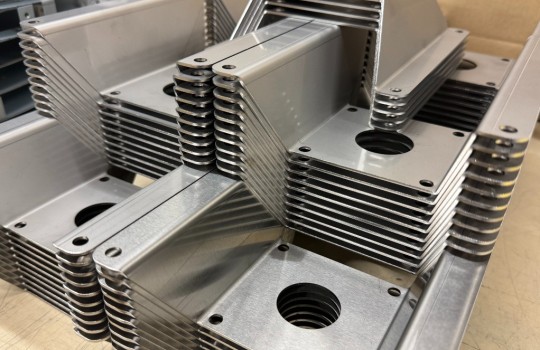
Crafting Precision with CNC Folding: Stainless Steel Brackets
CNC folding, a cutting-edge technology, is revolutionizing the way we create stainless steel brackets. This process utilizes computer numerical control (CNC) systems to manipulate stainless steel sheets into precise, customized shapes.
One of the standout benefits of CNC folding with stainless steel is the exceptional precision it offers. Whether you need brackets for industrial machinery, architectural structures, or custom applications, CNC folding ensures each bracket is exact to your specifications. This precision minimizes material waste and guarantees a perfect fit for your project.
Stainless steel is a popular choice for brackets due to its corrosion resistance and durability. With CNC folding, intricate designs and complex geometries can be achieved with ease, making it ideal for both functional and decorative brackets.
Additionally, CNC folding enhances efficiency, reducing production time and labor costs, which is especially beneficial for high-volume orders. The result is high-quality stainless steel brackets that meet the strictest industry standards.
https://www.vandf.co.uk/tooling/what-is-cnc-bending/
In conclusion, CNC folding is a game-changer in the production of stainless steel brackets, providing unmatched precision, versatility, and efficiency. This technology paves the way for the creation of brackets that not only serve their intended purpose but also exhibit exceptional craftsmanship.
#sheet metal work#manufacturing#cnc folding#cnc brake press#sheet metal manufacturing#cnc bend#angle brackets
3 notes
·
View notes
Text
Material expansion: At present, the types of materials for 3D printing are relatively limited. In the future, more types of materials can be explored, including new polymer materials, metal materials, ceramic materials, etc., to meet the needs of different fields.
Technological progress: At present, the speed, accuracy and quality of 3D printing technology still need to be improved. In the future, new printing technologies can be developed to increase printing speed, reduce printing errors and improve printing quality.
Diversified applications: At present, the application fields of 3D printing technology are still relatively limited. In the future, applications in more fields can be explored, such as applications in construction, medical, aerospace, automobile manufacturing and other fields, and its unique technical advantages can be exerted.
Intelligent development: In the future, artificial intelligence, machine learning and other technologies can be combined with 3D printing technology to realize intelligent design, optimization and production, and improve production efficiency and product quality.
Green development: At present, the waste and environmental protection problems generated by 3D printing technology still need to be solved. In the future, we can explore the path of green development, such as developing recyclable materials, reducing waste generation, etc., while paying attention to the impact on human body and environment .
Interdisciplinary cooperation: In the future, cooperation and innovation between different disciplines can be promoted, such as combining biology, chemistry, physics and other disciplines with material science, mechanical engineering, electronic information and other disciplines to jointly promote the development and application of 3D printing technology .
Cost reduction: At present, the cost of 3D printing technology is still relatively high. In the future, technological progress and large-scale production can be used to reduce costs and increase the penetration rate and application range.
2 notes
·
View notes
Link

Shenchong CNC press brake machines have successfully entered the Egyptian market. We have long-term cooperative distributors in Egypt.

In March 2023, Egypt customer ordered an automatic press brake bending machine for cable tray.
youtube
3 notes
·
View notes
Text
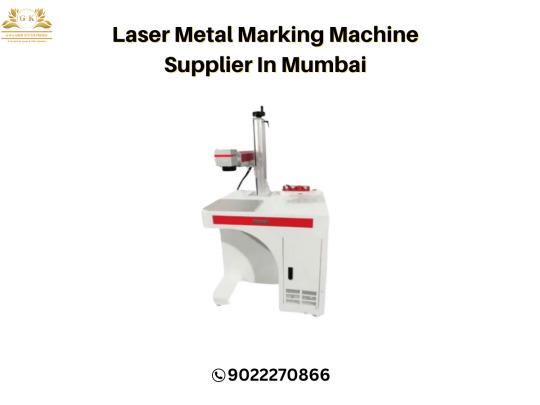
#Fibre laser Cutting machine in mumbai#cnc laser router dealers in mira road#acrylic manufacturers in mira bhayandar#laser cutting machine suppliers in vasai#laser metal marking machine supplier in mumbai
2 notes
·
View notes
Text
CNC Fiber Laser Cutting Machine supplier | CNC Fiber Laser Cutting Machine Manufacturer in pune, India | CNC Fiber Laser Cut | Fiber Laser Cutting Machine
Best company for CNC Fiber Laser Cutting Machine supplier, CNC Fiber Laser Cutting Machine Manufacturer in pune, Mumbai, Delhi, India. Buy CNC Fiber Laser Cutting Machine at best cost only berlin-machineries.com
#CNC Fiber Laser Cutting Machine#CNC Fiber Laser Cutting Machine supplier#CNC Fiber Laser Cutting Machine Manufacturer
2 notes
·
View notes